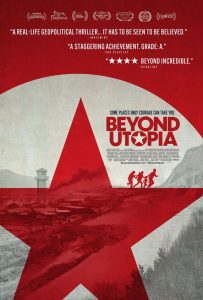
“Beyond Utopia”
(USA)
Metacritic (8/10), Letterboxd (4/5), Imdb.com (8/10), TMDB.com (4/5)
In today’s world, it’s almost unfathomable that there are places that exist on this planet that operate on the principles of unbridled cruelty, deliberate deception and mass brainwashing, with even the slightest of infractions capable of leading to banishment to remote gulags, brutal beatings and even savage public executions. However, such are the conditions of everyday life in North Korea, a paranoid, ruthless regime that doesn’t hesitate to inflict such indignities on its population and deprive residents of knowledge of anything beyond its borders. In a United Nations human rights report, the unthinkable tactics employed here have been described as being on par with those that were used in Nazi Germany. So it’s no wonder there are many who want to escape this harsh reality – that is, at least among those who are able to see beyond the artifice of the false utopian picture that officials have painted of their sorrowful nation. Getting out is far from easy, however, a harrowing venture that often requires defectors to flee northward to China and then maneuver through the challenging terrain of several neighboring Asian countries rather than simply crossing into nearby democratic South Korea, a sanctuary walled off by a de facto combat zone boobytrapped with countless land mines. Seeing what refugees must endure is the aim of documentarian Madeleine Gavin’s latest offering, a compilation of defector stories, including those who have succeeded in escaping and those attempting to do so. The latter are compellingly filmed with firsthand, on-the-ground footage, with no reenactments, showing in detail the ordeals they must go through to make their flights to freedom, sometimes successful, sometimes not. In the process, the film also provides audiences with a concise yet comprehensive history of how North Korea reached this point while revealing some little-known troubling secrets about everyday life in this mysterious land, many of which most outsiders have probably never heard of, let alone seen. Because of this, some of the picture’s imagery may be considered quite disturbing, especially for sensitive viewers, so those who are easily upset by such troubling visuals should take note. Nevertheless, this BAFTA Award-nominated release is an important piece of filmmaking that those outside this inscrutable enclave should know about – and hope that the world can help to overcome.




Leave A Comment